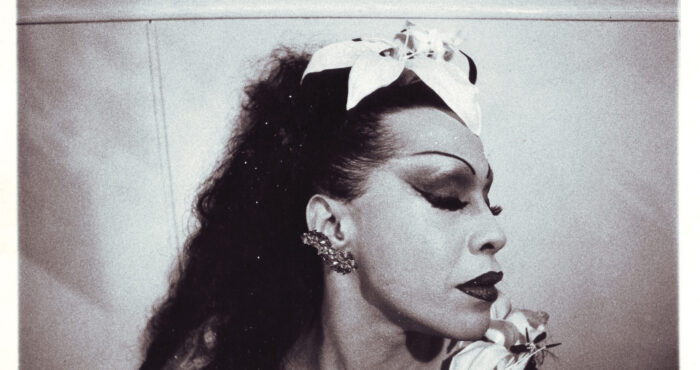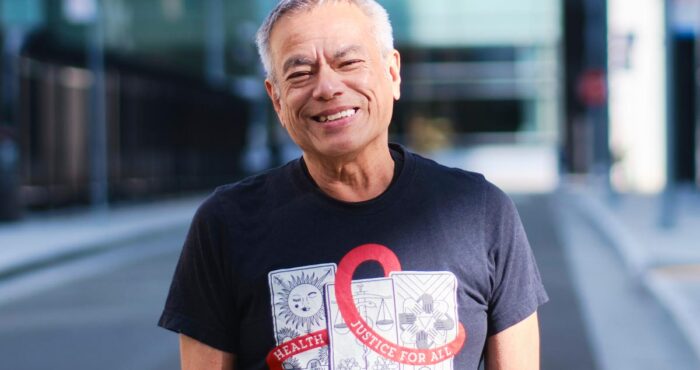Rocking the Status Quo: How HIV and AIDS Transformed Music and Culture

Music and world events have always been inextricably linked, and the HIV and AIDS crisis is no exception. The virus’s scourge left an indelible mark on the music industry, shaping the themes and lyrics of many songs.
In 1986, Jermaine Stewart released “We Don’t Have To Take Our Clothes Off” just as the CDC also announced that more people were diagnosed with AIDS in 1985 than in all the previous years combined. As cases continued to climb, the song suggested that penetrative sex wasn’t any less exhilarating than taking the time to get to know your sexual partner first.
In the song’s music video, Jermaine bounces around city streets, nightclubs, and bedrooms, singing, “Let’s just get to know each other, slow and easily.” Bright colors, neon lights, and bold fashion choices paint a fun, upbeat tone that promotes safer sex practices. The song celebrates how exploring sexual connections can be exciting, stimulating, and fulfilling without putting oneself or others at risk.
In 1996, the Broadway musical “Rent” featured “Seasons of Love,” a poignant and uplifting song that asked how we measure a year in a life, suggesting that the measure should be love. HIV-related deaths declined for the first time in 1996, but for thousands, the more effective treatments and awareness campaigns that arrived in the late 90s came too late. The virus had already claimed the lives of hundreds of thousands of people.
The topic of death clung to so many people’s minds who were impacted by the HIV and AIDS crisis. “Seasons of Love” encouraged listeners to reflect on how they spend their time on this earth and to focus on the love they give and receive. “Seasons of Love” was often played at memorial services and fundraisers for HIV and AIDS research and support organizations, a symbol of resilience and determination for those who lived through the epidemic.
One lyric may particularly go unnoticed, but nods to the death of a woman, which is particularly notable because the proportion of AIDS cases among women continued to increase in 1996. In 1996, women accounted for 20% of newly reported AIDS cases. In fact, access to healthcare for women living with HIV and AIDS has been a struggle ever since the beginning of the epidemic. Even today, medications may enable people with HIV to live longer than ever before, but in the U.S., women experience a greater negative influence on life expectancy with an HIV diagnosis than men.
Oakland Gay Men’s Chorus chose to proudly place “Seasons of Love” in its spring concert. This April 15 and 16, you can find the 50-member chorus bringing the beauty of this song to life with a live performance.
“Seasons of Love is primarily about “found family” — those people we intentionally surround ourselves with who offer us support, encouragement, and most of all, love,” said Dr. Ben Riggs, Artistic Director of the Oakland Gay Men’s Chorus. “Seasons of Love may be a song from the past, but I believe its message is timeless,” he continued.
In 1997, Janet Jackson dedicated “Together Again” to a friend who passed away from AIDS. The song expressed the hope of being reunited with a loved one who has passed away and finding comfort in the memories they shared. “Together Again” resonated with many who were grieving for someone lost to AIDS, offering a message of hope and healing.
At times musicians themselves, such as Freddie Mercury of Queen, Sylvester James, and Arthur Russell, all died from complications related to AIDS. Their loss was deeply felt in the music world as they were influential and innovative figures who helped shape the industry.
Many talented artists responded to the impact of HIV and AIDS on humanity by raising awareness and funds for HIV and AIDS research and supporting various organizations. “We Are the World,” released in 1985, brought together some of the biggest names in music to raise money for African famine relief. The annual AIDS benefit concert “Red Hot + Blue” also raised awareness and funds for AIDS research and support organizations.
The HIV and AIDS epidemic also inspired a range of charity singles. Dionne Warwick, Stevie Wonder, Elton John, and Gladys Knight all collaborated on “That’s What Friends Are For,” a song which inspired other artists to use their platform to raise awareness and funds for the epidemic.
Musicians continue to use their platform to advocate for HIV and AIDS awareness and prevention, and the music industry has come a long way in terms of acceptance and inclusion. The music industry has shown its resilience and ability to come together in the face of a crisis, reminding us of the power of music to educate as well as bring hope, comfort, and healing.










